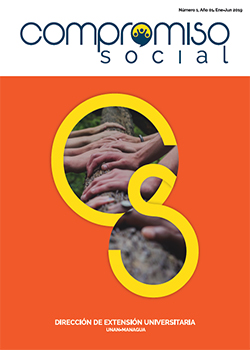Community interventions: A form of non-formal education
DOI:
https://doi.org/10.5377/recoso.v1i1.13412Keywords:
Education for health, community, interventionAbstract
The Quality of Life Observatory started in 2009, as an experience of international cooperation funded by the Excellency Town Hall of two Sisters of Seville, Spain and the National Autonomous University of Nicaragua, Managua. Its purpose is to promote education for the prevention of Sexually Transmitted Diseases, HIVAIDS, fight addictions, promote healthy lifestyle habits and encourage work safety measures. All this through talks, seminars, workshops and other actions designed to educate on these subject.
The last edition of this project was carried out in the 30 de Mayo, Che Guevara and Pedro Joaquín Chamorro neighborhoods, among others. Through community actions in union of different social actors to contribute to the fulfillment of the millennium challenges and the mission of the University in its university extensión policies, it has benefited specific sectors of society such as children and adolescents at risk in Juigalpa, Chontales.
The main beneficiaries are adolescents, children, young people and citizens of the economically active population in a vulnerable state. Its main lines of action are the formation of schools-workshops to mitigate the social risks of children, adolescents and young people, as well as improving the health conditions of the beneficiary population; influencing healthy eating practices through school gardens and the improvement of the school snack. All this with a non-formal education approach.
1586
Downloads
Published
How to Cite
Issue
Section
License
Copyright (c) 2019 Universidad Nacional Autónoma de Nicaragua, Managua (UNAN-Managua)

This work is licensed under a Creative Commons Attribution-NonCommercial-ShareAlike 4.0 International License.




